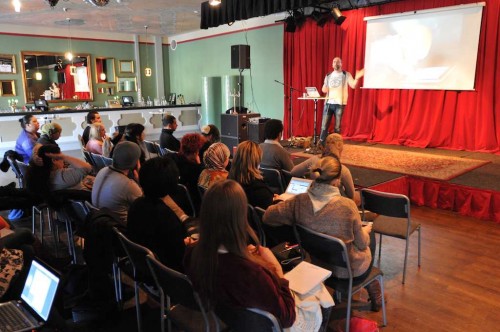Joakim Jardenberg’s session on digital networks and social change turned out to be more interactive than even he expected: DXFers brimming with opinions soon turned his talk into a dialogue instead of a monologue, and the enthusiasm on all sides was contagious.
Joakim started off his presentation (see his slides below) quoting from the introduction to Amnesty International’s 2011 annual report, which proved to be prescient:
The year 2010 may well be remembered as a watershed year when activists and journalists used new technology to speak truth to power and, in so doing, pushed for greater respect for human rights. It is also the year when repressive governments faced the real possibility that their days were numbered.
This was one type of social change he wanted to highlight. Another was how access to knowledge and to tools for social change management is very quickly becoming much broader. Once, only those with access to the Library of Alexandria had such knowledge at their disposal. Today, it is accessible to everyone with an Internet connection. Although technology will never be completely evenly distributed across society, Joakim argued, things are getting more equal, over time.
A third kind of change was highlighted by watching his 11-month old daughter unlocking an iPhone. Nobody told her it was supposed to be hard. To the next generation, these new technologies are part of the landscape, Joakim said. And they are here to stay, so our responsibility is to make sure they are used for good, rather than bad.
Joakim had much more to say in the two hours he spent with DXFers — leading a discussion on how much digital networks precipitated the Arab Spring (or not); on the utopian vision of technology promising “zero friction” in social change management, but how the human element is a crucial missing element — Joakim admonished DXFers “to be the grease”. There was also much talk about the notion of the “Technium” — of the Internet and associated technologies turning into something as complex and intelligent as a human brain, and if this process inevitable, how it is our duty as contributors to this machine to steer it towards benign ends.




Comments are closed.